
Dr. Strangelove or: How I Learned to Stop Worrying and Love the Bomb (1964)
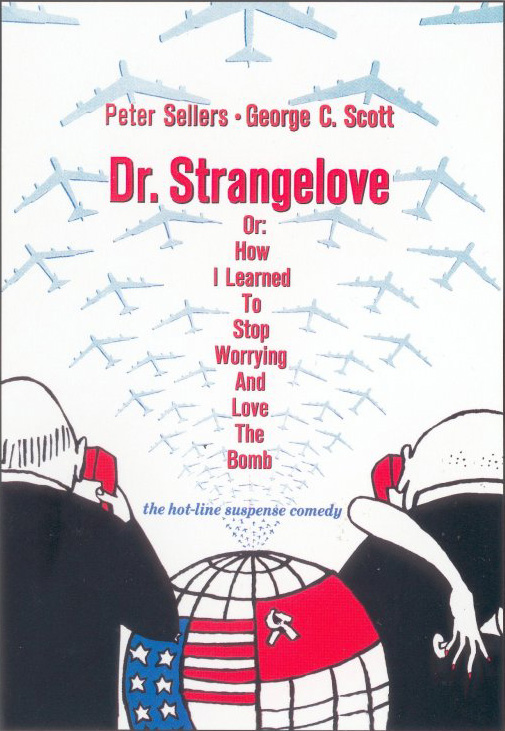
THE TRAILER
THE DIRECTOR
Stanley Kubrick
THE ACTORS
Peter Sellers (Captain Lionel Mandrake/President Merkin Muffley/Dr. Strangelove), George C. Scott (General Buck Turgidson), Sterling Hayden (General Jack D. Ripper), Slim Pickens (Major Kong), Peter Bull (Alexi de Sadasky), Keenan Wynn (Colonel Bat Guano),
THE CAUSE
Nuclear War
THE STORY
“For more than a year, ominous rumors have been privately circulating among high-level western leaders that the Soviet Union had been at work on what was darkly hinted to be the ultimate weapon: a doomsday device. Intelligence sources traced the site of the top-secret Russian project to the perpetually fog-shrouded wasteland below the Arctic peaks of the Zhokhov Islands. What they were building or why it was located in a remote, desolate place no one could say.”
“In order to guard against surprise nuclear attack America’s Strategic Air Command maintains a large force of B-52 bombers airborne 24 hours a day. Each B-52 can deliver a nuclear bomb load of 50 megatons equal to 16 times the total explosive force of all the bombs and shells used by all the armies in World War II. Based in America, the Airborne Alert Force is deployed from the Persian Gulf to the Arctic Ocean. But they have one geographical factor in common. They are all two hours from their targets inside Russia.” – Opening narration
THE RUNDOWN
Stanley Kubrick is one of the most celebrated directors in the history of film. Though he started in the 1950s and had a few hits to his name (most notably the Kirk Douglas film Spartacus) he’s really better known for his latter films such as 2001: A Space Odyssey, A Clockwork Orange, The Shining, and Full Metal Jacket. Film nerds love him, film-makers find him hugely influential, and he is by all accounts a hero of the film-making world.
But the more beloved a thing, the more people look for reasons to shit on it. A lot of Kubrick’s detractors are more literary minded, they point out that Arthur C. Clarke’s novel 2001: A Space Odyssey (developed in co-operation and parallel with Kubrick’s film) makes a hell of a lot more sense than the movie. They point out that by removing the final chapter from A Clockwork Orange (an omission that annoyingly happened to the novel after the film was released), Kubrick removed the entire summarizing statement of the film. And they definitely point out that, though his haunted hotel romp The Shining is a chilling and viscerally effective piece of horror cinema, Kubrick wasted so much time putting in deep symbolism into every frame and demoralizing Shelley Duvall that he forgot to add the entire emotional core and lead character arc of Stephen King’s novel. I’m not here to say whether those statements are right or wrong, though I agree with each one to some degree or another.
Kubrick was a great producer and a genuinely legendary cinematographer. He managed to wring great performances out of his actors even if it meant violating their human rights. What the man was not so hot at was writing. An average Kubrick film is beautiful and wondrous, but generally sparse when it comes to characters and plot. (Of course there are no absolutes and I’ve not even seen all of Kubrick’s films so your carefully worded rebuttal, while appreciated, is not necessary. This is just my subjective opinion.) What I’m trying to gently ease you into, dear readers, is the fact that I’m not a big Kubrick fan, though I have tried to be on multiple occasions. With that said, you know what movie is fucking wonderful? Dr. Strangelove!
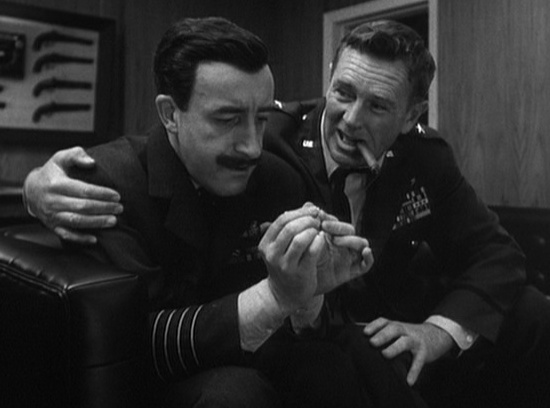
The story here concerns a U.S. army general, Jack Ripper (Sterling Hayden), who orders a group of nuclear-capable bombers to drop their payloads on their targets in Russia, using a loophole in the military code whereby he can order a nuclear attack without the President’s say-so if the White House has come under attack. He promptly orders complete radio silence, locks down the base, and orders all civilian radios confiscated.
In the process of collecting the radios, a British Air Force Captain, Lionel Mandrake (Peter Sellers), discovers that Washington hasn’t been attacked after all and that Ripper called the attack to force the United States into a war with Russia because he believes that fluoridation in the water is a secret communist plot to weaken the bodily fluids of Americans.
In Washington D.C. in the military’s “War Room” all the highest military leaders meet to discuss Ripper’s treason and what can be done since the bombers can only be recalled with a secret code known only to Ripper. General Buck Turgidson (George C. Scott) recommends a full assault on Russia but President Merkin Muffley (Peter Sellers) refuses to be backed into a corner. He contacts a visiting Russian Ambassador (Peter Bull) who informs him that Russia is outfitted with a doomsday device that can be triggered by even a single nuclear bomb. When triggered the device sets off a series of mega-nukes that put a plume of a deadly radioactive material into the atmosphere which will last for 93 years, effectively killing off all the life on Earth. As former Nazi scientist Dr. Strangelove points out, a doomsday device doesn’t do a very good job of deterring attack when nobody knows about it. The Ambassador apologizes, explaining that the Russian leader was unveiling it on Monday because he likes surprises.
Since the bombers can’t be called back without a code and any attempt to shut the doomsday device off will cause it to trigger, the Americans rush to find a way to call back the planes and the Russians rush to shoot them down. Meanwhile, Captain Mandrake tries to talk General Ripper into giving him the codes so that he can save the day.
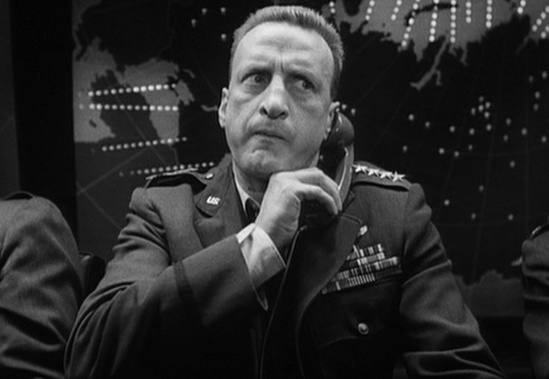
On paper, Dr. Strangelove is a crazy movie. It’s a pitch-black thriller about a rogue military commander bringing about the end of the world (I know that’s a spoiler but this is an apocalypse movie column, so you knew where this was going) filled with screwball comedy. The movie is a farce, but it’s a farce with real stakes. From a comedic standpoint it sort of bridges the gap between Duck Soup and Airplane, going from great satirical humor (“Gentlemen, you can’t fight in here this is the war room!”), to nonsensical (the contents of the kits each crewman of the bomber is issued for their bombing run which includes, among other things, five tubes of lipsticks and silk stockings), to the whoopee-cushion caliber lame jokes (the name of nearly every single character.)
The showpiece of the movie is, of course, Peter Sellers. Sellers is at the top of his game here in 3 roles in the movie, weirdly two of his characters are in the same setting when it would make far more narrative sense to just let someone else play the president and have Sellers play one of the bomber’s crew. Regardless he does a fine job as the milquetoast airman Mandrake, who isn’t terribly funny but is his largest role in the film and the best showcase of his acting abilities. Sellers is less impressive as The President, who gets a few funny lines (including the aforementioned one about fighting in the war room) but doesn’t give Sellers a lot to do beyond show how capable he was at doing an American accent. Last is the titular Dr. Strangelove, a character who has only two scenes and less than eight minutes of screen time. Strangelove is nothing special as a character and Sellers does an atrocious job of mimicking a German accent, but he imbues the character with bizarre tics such as his trouble with controlling his right arm (which keeps “Sieg heil” saluting unbidden and refusing to let go of things) or his tendency to mistakenly refer to the president as “Mein Fuhrer.” Strangelove is really a nothing character who belongs in a cheesy comedy sketch but Sellers manages to make him seem like the most important character in the movie, so it’s really no surprise his name is in the title.
As wonderful as Peter Sellers is in this movie, he doesn’t hold a candle to the comedic tour de force that is George C. Scott. I have no idea what sort of madness overtook Scott when he took this role but he owns every single frame in which he appears. He has a manic energy that combines with his gruff demeanor in some kind of wondrous alchemy that works as the thesis statement of the movie all on its own. Kubrick wisely puts the lens on Scott during a great deal of the talking scenes, letting him tell entire stories on the sidelines with mere body language and facial expressions. Amusingly, this movie may have been what got George C. Scott the role of General George S. Patton.
While no-one else commands the screen in this film like Sellers and Scott, I would be doing a disservice if I didn’t mention Sterling Hayden as the intense crazed general, Slim Pickens as the bomber pilot who appears in the film’s most iconic shot, and Keenan Wynn as the army colonel who encounters Captain Mandrake and begrudingly helps him to give the nuclear codes to the President whilst accusing him of being a “pre-vert.” And if you look closely, James Earl Jones turns up briefly in a scene toward the end of the film as one of the bomber’s crew-members.
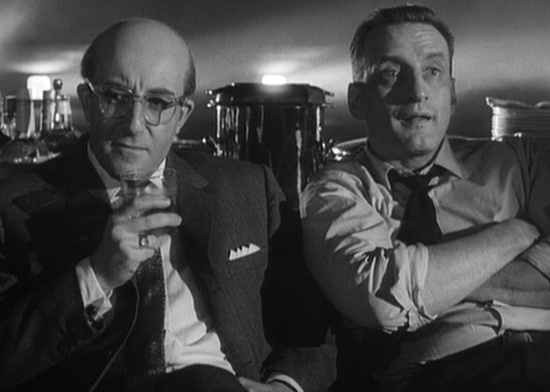
I already played my hand above, but I genuinely love this movie and I don’t really see how anyone can’t. The plot has that stripped-down quality that Kubrick tended to favor but the actors fill the screen with personality from beginning to end. The humor is incongruous but considering the way that Dr. Strangelove’s brother film, Fail-Safe was received and the melodramatic nonsense of other popular post-nuke films like On the Beach, a farcical skin laid over a darker-than-black plot seems to be the way to handle the material. The comedy works as a way of exposing the stupidity and childishness of Cold War-era United States and Russian leaders and is at its funniest when it’s mocking the paranoid delusions of people from that era. And the tone really pays off in the film’s final moments during a montage of nuclear explosions set to Vera Lynn’s We Will Meet Again. It’s like a Tom Lehrer song put to film.
Dr. Strangelove is an example of Stanley Kubrick using all his best instincts along with a strong cast and a story that works on that simple level in which he tended to work. There are a lot of cases made for The Shining or 2001 being Kubrick’s masterwork but I’ll stand by this movie as the high point of his career, the movie where everything worked exactly as it was supposed to. It’s the one Kubrick film that I would change nothing about.
THE SHILL
Dr. Strangelove is available on DVD and Blu-Ray through the Criterion collection and is available on Amazon Instant.
NEXT TIME ON DOOMSDAY REELS
In the days of evil and anarchy you had freedom to, now you are granted freedom from. Don’t underrate it.
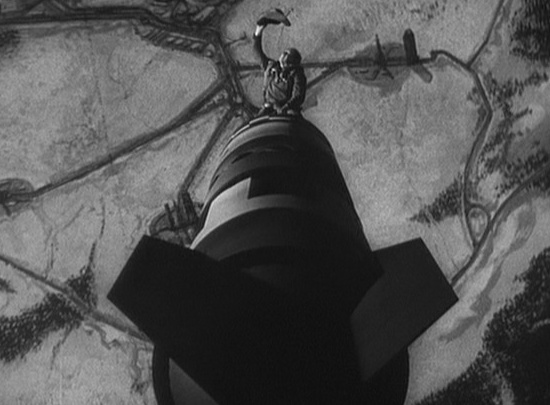
Discuss this and other Doomsday Reels columns in the forum.
I chose a significant film for this column for a reason. Not counting the three April Fools Day columns, this marks the 100th Doomsday Reels. I’ve been doing this column every two weeks (and then some) since August of 2014 and I’ve no intent of stopping any time soon. Thank you everyone for three years of indulging my self important tendencies and thank you to all the people who have commented throughout the years, even if it was to tell me what an obtuse asshole I am (it’s cool, I already know.) I’m humbled by the minor internet celebrity that doing this column has afforded me and I’m embarrassingly proud of having Night of the Comet’s Kelly Maroney like my column on Twitter or of hearing Drew Dietsch and Travis Newton plug my writing, even if they always mispronounce my name. It’s been a fun ride and I’ve loved every minute of it, but there’s still a lot of great movies left to cover and some not so great ones that should be fun to talk about at least, here’s to 100 more and beyond.